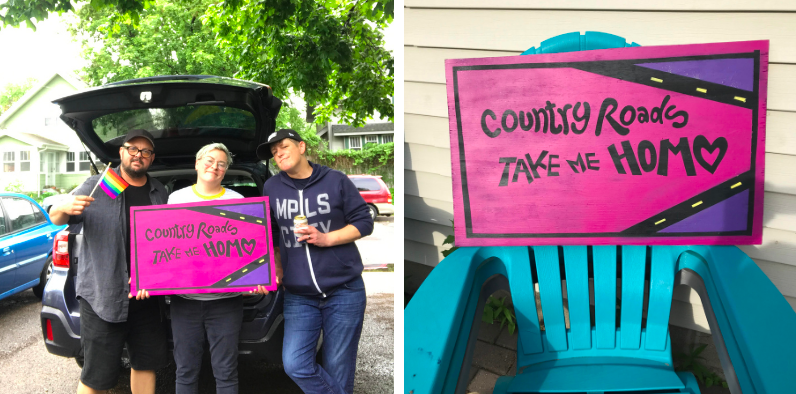Country Roads, Take Me Homo is an ongoing series chronicling Ty Yule’s experience at small town Pride events across America.
For the past thirty years, I’ve lived as a big Queer in a big city. I flounce Queerly about in my South Minneapolis bubble, never anticipating rude or rough treatment associated with my Queerness. During the handful of occasions I’ve experienced any kind of harassment in the last decade, it always took me a moment to realize it was in response to my Queerness. My brain had to process oh, you’re being an asshole because I’m Queer. Sorry, it’s been a while. Just a moment while I become annoyed and respond accordingly.
Relatively speaking, I live a life of great privilege. I am middle-aged. I am able-bodied. I am not detrimentally poor or houseless. I pass as a cis man. Though many assume me gay because of my gayface, this is rarely a catalyst for aggression. I am white, which accounts for the bulk of my social ease. The most impactful decision I ever made was fleeing an ugly, conservative small town for San Francisco when I was barely twenty-one. That one moment led to my full life, largely unburdened by ongoing social confrontation.
That was 1991. I found a warehouse job starting at $12 an hour and a beautiful one-bedroom flat in the Mission for $550 a month. I also found a whole population of transgressive, creative, hot dykes with some income and cheap apartments within blocks of mine. There were small, independently-owned venues for rock shows and performance art. There were dives and queer-owned businesses that were run by weirdos who would hire weirdos. The circumstances of that small economy in that place and time allowed a community of activism, creativity, and mutual support.
There were also a ton of drugs and explosive relationships. That fact, compounded by the dot-com boom of the late nineties driving up rents, steered me towards Minneapolis in search of deeper roots. I bought a house for $55,000 in a South Minneapolis neighborhood. I found a different community full of Queers, art and activism, and loving, lasting relationships.
Thirty years later, the minimum wage in San Francisco is only $16.32 an hour, but that same apartment is $2600 a month. I’ve watched my South Minneapolis neighborhood, after the 2008 financial collapse, lose its long-term residents, become abandoned, then voraciously purchased, painted, and flipped. The pandemic last year turned into a diabolical bonus for private equity firms to further capitalize on economic hardship and suffering. My old, Queer, unprofessionally rehabbed house is now worth almost $300,000 because it has two bathrooms.
While there are a number of productive and terrifying potential discussions to be had on the fallout of the increasingly brutal disposition of our current capitalistic dystopia, I wonder what the effect has been on Queer culture in urban environments and what small-town Queers are doing now that big city life is almost completely financially prohibitive?
I think over the last twenty years that these evolving economic challenges have had a substantial impact on Queer life in both urban and rural environments. There have also been the effects of the internet with easily acquired information and access to virtual communities Queers didn’t have prior to the late 90s. Lesbian and gay relationships have also been mainstreamed in much of popular media and civic culture, at least in the cities. There was near zero Queer representation in popular culture in the 80s and hardly anyone was out. Concurrently, the perceived political divide between urban and rural world views has intensified in the last decade and has consolidated the fears we each have of the other.
A good way to connect with small town Queers to see how they’re doing might be Pride. Having Queer in common is always a good conversation starter. A 2019 article by our friends at them. highlighted a recent rise in the numbers of small-town Prides being celebrated across the Midwest. They credited escalating anti-LGBTQ, right-wing rhetoric as a primary motivation for the increase in frequency. The article also implied a growing number of Queers might be staying in small towns.
City Queers have been cynical about their Prides for years. We also take them for granted. Corporate sponsorship has hobbled our unicorns and commodified our sparkle. Upon entering Pride season 2021, urban organizers are arguing whether cops in uniform should be allowed to march in parades and mainstream media outlets are once again taking up our perennial cat fight over kink at Pride. The queens in charge should know better.
But how is it to be Queer in a small town after Trump? What’s it like to organize a small town’s first Pride? What if you’re in the Bible Belt? How much courage does that take? Do we remember what it feels like to be bullied and alone? What did our first Pride mean to us?
A few weeks ago, my friend Megan asked me how my book sales were going. I admitted they had stalled, but suggested I thought it might be fun to drive to small-town Prides all summer long, set up a little table with my book, and use it as a reason to sit there and talk to Queers all day and listen to their stories.
Megan thought that was the funnest idea ever, which it is, and decided to tag along. Our friend, Jeffy, heard about it and was all in. So I started hunting for small town Prides.
First stop: Hardy, Arkansas.
Stay tuned for the next installment.


What Do You Think?